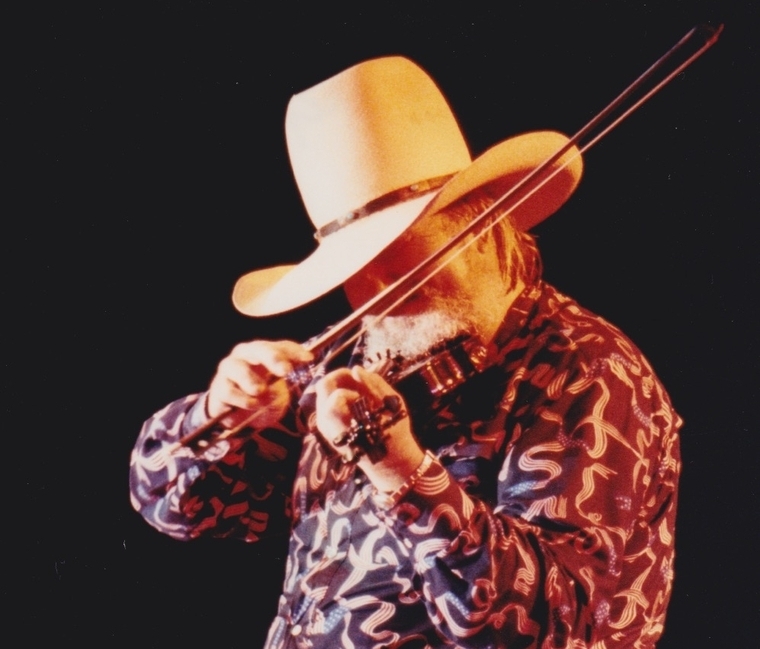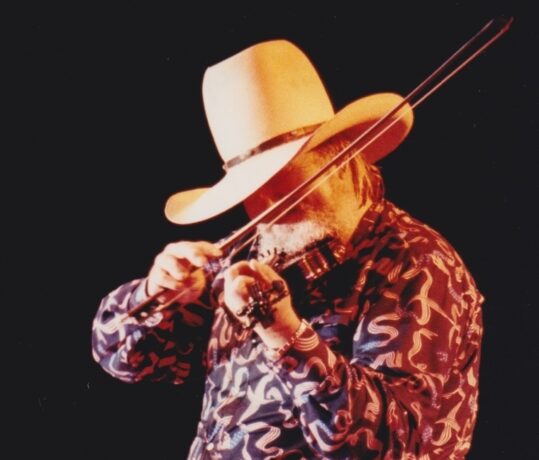The Devil Went Down To Georgia – And Won
The Devil Went Down To Georgia – and Won

When I was nine years old in 1979, Charlie Daniels’ “The Devil Went Down To Georgia” was THE dominant song on the radio – and I mean ALL radio. It didn’t matter what station I dialed in on my radio headphones: country, rock, top-40, even the college station out of Peoria were all playing Daniels’ proto-culture war anthem with its obvious debt to Faust. My mom didn’t like the song at all. I remember her “banning” it at one point, telling my brother and me that she didn’t want us listening to “that devil song” anymore. In all of my nine-year-old indignation, I seem to recall pushing back against her concerns. “Are you really worried that we are going to sell our soul to the devil?” I asked. “I’m pretty sure if the devil was ever to actually come and make us some kind of deal for our souls he’d be way smarter about it than that. He’d also probably be better at any musical instrument than we could possibly be.”

I’m pretty sure mom hadn’t thought about it that deeply. She didn’t like that “sonofabitch” line – and she knew that we knew that even though they changed that word for the radio, that’s exactly what we were singing in our little heads and hearts every time it came around. She was right, of course.
We lost Charlie Daniels on July 6, 2020, when he died of a stroke. Daniels had an incredible impact on the music world. He wrote a song for Elvis in 1964, played guitar and bass on Dylan’s Nashville Skyline album, and worked with Leonard Cohen, George Harrison, Emmylou Harris, and others who traveled well outside of either the Country or Rock worlds. His band hosted a festival in the early 70s that gathered a diverse group of artists together to play, including Lynyrd Skynyrd, James Brown, John Prine, and Stevie Ray Vaughn. But as with many artists, all of that gets overshadowed by one big hit – and Daniels will always be known for “The Devil Went Down To Georgia.” It landed him a Grammy, and in 1980 he made significant contributions to the Urban Cowboy soundtrack. Over time he transitioned from identifying with the counter culture and the outsider, endorsing and playing for President Jimmy Carter, for instance, to become closely identified with right-wing politics, the NRA, and all things Republican.
I got a chance to talk with Charlie Daniels on his bus right before his performance on the mainstage at the Cornerstone Festival in 1994. He had embraced Christianity and sobriety since his heyday as a rebel hellraiser in the 70s and had released a Gospel country album called The Door that he wanted to perform for a Christian audience. It was a top-notch set of Southern-fried country-rock performed with a level of professionalism that Christian music fans rarely witnessed. And while the crowd at Cornerstone was wide open to Daniels’ classic fare – including “The Legend of Wooly Swamp,” (one of my favorites,) and even a cover of “Satisfaction” by the Rolling Stones, when he got to the part of his set where he advocated “stringing up drug dealers from these lamp posts out here” as an easy solution to “violent crime,” which he simplistically blamed on drugs, and then mocked a cartoonish characterization of then Surgeon General Jocelyn Elder’s ideas about exploring the decriminalization of drugs and the study of the medicinal properties of marijuana, he lost a big part of the crowd. Elders, the first African American woman to be appointed Surgeon General in the US, was forced out of her position by then-President Bill Clinton for even suggesting such “radical” ideas. Of course, many of those ideas have become law, now, and others are regularly discussed by serious-minded policy experts.
While Daniels received a smattering of applause from the crowd, (there was a much larger percentage of locals in the audience that night,) many of the Cornerstone regulars began making for the exits. He was completely out of step with the ethic of the Cornerstone culture, the teaching of grace, and a deeper consideration of the complex issues plaguing our society, and what it meant to love in difficult times. (The attractive female backing vocalist in the tight clothes was a problem for many as well.) To their credit, though, at least Cornerstone allowed this conflict of images to happen on their stage. Looking back, it’s an interesting encapsulation of the early days of the Red State / Blue State divorce that was happening in America, and a glimpse into Evangelicalism’s growing enchantment with simple political power over complicated and costly grace. For me, at twenty-four years of age, it was an eye-opening moment. I had been a fan of Daniels’ rebel style, his simple “kick the devil’s ass” message and his “Long Haired Country Boy” attitude. But that night I started to realize that when the devil comes with a contract, he is much cleverer than we expect. The golden fiddle he lays at our feet is never so obvious.
And now, a quarter-century later, I am learning that when Ol’ Scratch comes to me, he offers me victory over my adversaries through sharp words on social media. He offers me comfort through material things that he reminds me I have “earned.” He offers me the privilege of entitlement. He offers me the ground under my feet that must be mine because I am standing on it. He says, softly, and often with Bible verses in his mouth, that the war I am waging against flesh and blood is justified because these enemies are really bad and God needs my help. He nestles seeds of resentment deep into my heart and nurtures my hunger for vengeance. He fans any flicker of grievance into a flame that will burn away the humanity of anyone I perceive as my enemy so that actions taken against them will be justified. He encourages me to dismiss any thoughts, information, or reproof that come from sources not aligned with my pre-chosen prejudices and preferences. Thoughts of turning the other cheek and picking up my cross will become merely philosophical, while all kinds of self-protection, self-interest, and self-aggrandizement become merely “practical” or even political concerns. The golden fiddle is taken from me in a million little pieces, one tiny bit at a time.
The real danger about grand Faustian myths, and great epic battles, is when they distract us from the myriad small ways we sell our souls every day.
When Daniels set up “The Devil Went Down To Georgia” for his finale at Cornerstone he started by clarifying “You can’t beat the devil without the Lord. So let’s get together and give him a fit right now.” Now, that’s a fun setup to this classic tune – but it still misses the point by a country mile. Setting aside the lingering urban vs rural / disco vs country / “them” vs “us” culture war the song not so subtly reinforces, Johnny’s mortal sin is hubris. He lost that battle with the devil by taking the bet in the first place. In this, Daniels captures America perfectly. Johnny is America. Johnny is the church right now. We think we can beat the devil by playing his game.
Even as a kid I always pictured at the end of that song, when Johnny belts out that vitriolic climax, “I told you once, you sonofabitch, I’m the best there’s ever been!” that Satan was walking away, tail between his legs, head down, and smiling.




